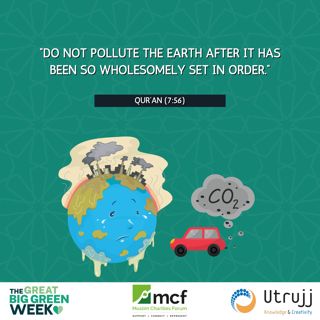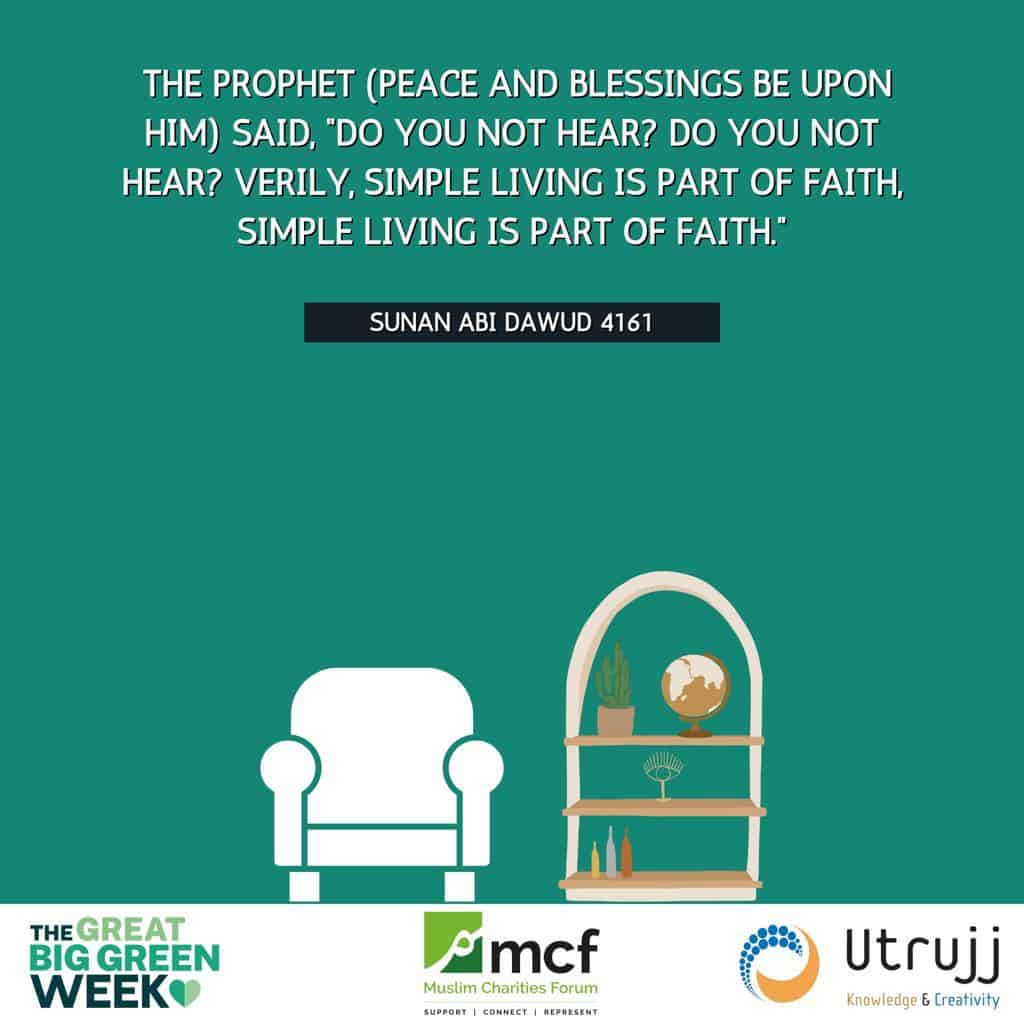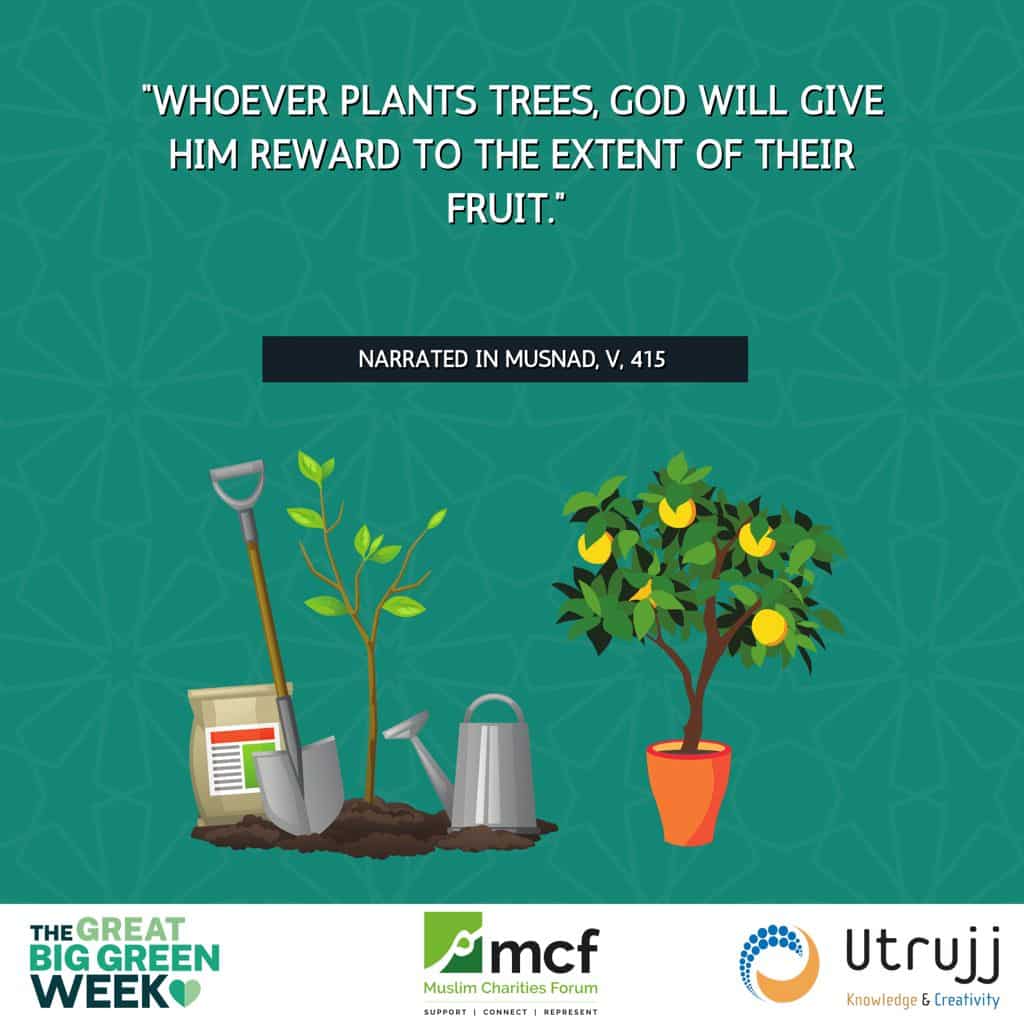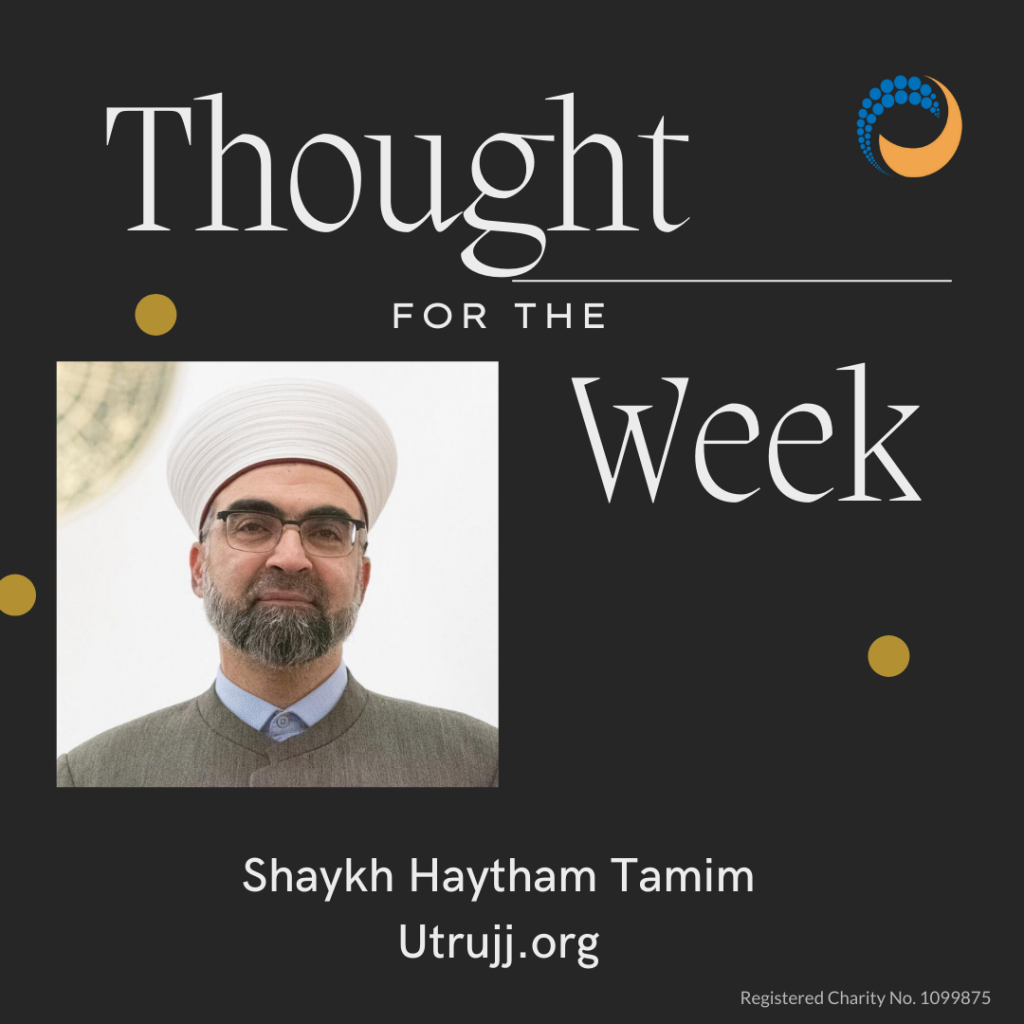Great Big Green Week

As it is Great Big Green week, I thought it is important to talk about the environment from an Islamic point of view. Allah Almighty said in the Quran that He placed man on earth, beginning with Adam as trustees on earth. He appointed us, Adam’s offspring, to this role and gave us this responsibility.
Humans were appointed guardians and trustees of the earth
وَإِذْ قَالَ رَبُّكَ لِلْمَلَائِكَةِ إِنِّي جَاعِلٌ فِي الْأَرْضِ خَلِيفَةً ۖ قَالُوا أَتَجْعَلُ فِيهَا مَن يُفْسِدُ فِيهَا وَيَسْفِكُ الدِّمَاءَ وَنَحْنُ نُسَبِّحُ بِحَمْدِكَ وَنُقَدِّسُ لَكَ ۖ قَالَ إِنِّي أَعْلَمُ مَا لَا تَعْلَمُونَ
When your Lord said to the angels, I am placing a successor – a trustee on earth.’ They said, ‘Will You place in it someone who will cause corruption in it and shed blood, while we declare Your praises and sanctify You?’ He said,’ I know what you do not know. (2:30)
Allah Almighty mentioned that He was appointing a guardian on earth and He created man from the earth and there are plenty of verses, in the same vein, talking about humans as caretakers on earth.
In another verse Allah Almighty said we should not pollute the earth that Allah perfected:
وَلَا تُفْسِدُوا فِي الْأَرْضِ بَعْدَ إِصْلَاحِهَا وَادْعُوهُ خَوْفًا وَطَمَعًا ۚ إِنَّ رَحْمَتَ اللَّهِ قَرِيبٌ مِّنَ الْمُحْسِنِينَ
And do not corrupt on earth after Allah’s reformation, and pray to Him with fear and hope. God’s mercy is close to the doers of good. (7:56)
ۖ هُوَ أَنشَأَكُم مِّنَ الْأَرْضِ وَاسْتَعْمَرَكُمْ فِيهَا فَاسْتَغْفِرُوهُ ثُمَّ تُوبُوا إِلَيْهِ ۚ إِنَّ رَبِّي قَرِيبٌ مُّجِيبٌ
He created you from the earth, and settled you in it. So seek His forgiveness, and repent to Him. My Lord is Near and Responsive. (11:61)
Earth is an amanah
The earth is a gift to us as our home.
It is an amanah (trust) from Him. When Allah Almighty offered the mountains the Amanah of carrying belief, they refused to accept it.
﴿٧٢﴾ إِنَّا عَرَضْنَا الْأَمَانَةَ عَلَى السَّمَاوَاتِ وَالْأَرْضِ وَالْجِبَالِ فَأَبَيْنَ أَنْ يَحْمِلْنَهَا وَأَشْفَقْنَ مِنْهَا وَحَمَلَهَا الْإِنْسَانُ ۖ إِنَّهُ كَانَ ظَلُومًا جَهُولًا. الأحزاب.
We did offer the Trust to the heavens and the earth and the mountains, But they refused to undertake it, and were apprehensive of it. Yet the human being undertook it. Indeed he is unjust (to himself), unaware (of the end). (33:72)
However, mankind has been entrusted with looking after the planet and all it contains.
عن أبي سعيد الخدري رضي الله تعالى عنه أن رسول الله، صلى الله عليه وسلم، قال: “إن الدنيا حلوة خضرة وإن الله تعالى مستخلفكم فيها، فينظر كيف تعملون” ((رواه مسلم)).
Abu Sa’id Al-Khudri (may Allah be pleased with him) reported that the Messenger of Allah (peace be on him) said:
“The world is beautiful and verdant (alluring); and verily Allah Has made you the stewards in it, in order to see how you act “. (Muslim)
Live simply

Allah is directing us how to live our life on earth, without being excessive or wasteful.
وَلَا تُسْرِفُوا ۚ إِنَّهُ لَا يُحِبُّ الْمُسْرِفِينَ
and do not be excessive. He does not like the wasteful. (6:141)
﴿٣١﴾ يَا بَنِي آدَمَ خُذُوا زِينَتَكُمْ عِنْدَ كُلِّ مَسْجِدٍ وَكُلُوا وَاشْرَبُوا وَلَا تُسْرِفُوا ۚ إِنَّهُ لَا يُحِبُّ الْمُسْرِفِينَ
O Children of Adam! Dress appropriately at every place of worship. And eat and drink, but do not be excessive. He does not like the extreme. (7:31)
Allah Almighty deterred us from this by warning us:
Surely, squanderers are brothers of satans, and the Satan is very ungrateful to his Lord. (17:27)
Allah Almighty encouraged the Prophet (peace be on him) to be green. Anas (may Allah be pleased with him) reported God’s Messenger (peace be on him) as saying:
وَعَنْ أَنَسٍ قَالَ: قَالَ رَسُولُ اللَّهِ صَلَّى اللَّهُ عَلَيْهِ وَسَلَّمَ: «مَا مِنْ مُسْلِمٍ يَغْرِسُ غَرْسًا أَوْ يَزْرَعُ زَرْعًا فَيَأْكُلُ مِنْهُ إِنْسَانٌ أَوْ طَيْرٌ أَوْ بَهِيمَةٌ إِلَّا كَانَت لَهُ صَدَقَة» متفق عليه
وَفِي رِوَايَةٍ لِمُسْلِمٍ عَنْ جَابِرٍ: «وَمَا سُرِقَ مِنْهُ لَهُ صَدَقَة»
“If any Muslim plants something or sows seed from which man, bird, or beast eats, it counts as sadaqa for him.” (Bukhari and Muslim)
In a version by Muslim from Jabir it says that what is stolen from it counts as sadaqa for him. This is encouraging us to plant more and look after our planet.
Acknowledge the problem
Climate change is a reality. We need to face it. Our actions impact the planet and are affecting the future of our planet for our future generations. We do not have another planet to go to. There is no planet B. We have only the earth.
Though we still have deniers of climate change, we can see the devastating effects of it all around us. We are experiencing extremes in weather all over the globe. In the UK alone over the last decade, we have witnessed a growing catalogue of natural disasters we have been hit by severe weather, snowfalls, droughts, floods, storms and hurricanes one after another. We have seen this in other parts of the world as well.
We have experienced travel chaos, school disruption, we have had people dying in heat waves, damage to properties, homes left without power, falling trees and water bans.
Weather records are being broken all the time – we are constantly experiencing the coldest, wettest and hottest days on record. We are statistically more likely to be flooded than burgled. The UK environment agency links the dramatic increase in flooding to climate change. And flooding is a major national threat.
The effects of the changing climate is creating havoc with farming and food production, with plants flowering and fruiting at the wrong times and causing chains of problems to animal vegetation.
We need to act
Since 2015, the UN put together Sustainable Development Goals (SDGs) which are well known in the business world, out of the realisation that humans are interdependent on each other. Humanity lives in global society that goes beyond national borders.
It came up with 17 goals set to reduce the harm that we are causing to the planet. There have been many conferences and seminars on this and targets.
GOAL 1: No Poverty
GOAL 2: Zero Hunger
GOAL 3: Good Health and Well-being
GOAL 4: Quality Education
GOAL 5: Gender Equality
GOAL 6: Clean Water and Sanitation
GOAL 7: Affordable and Clean Energy
GOAL 8: Decent Work and Economic Growth
GOAL 9: Industry, Innovation and Infrastructure
GOAL 10: Reduced Inequality
GOAL 11: Sustainable Cities and Communities
GOAL 12: Responsible Consumption and Production
GOAL 13: Climate Action
GOAL 14: Life Below Water
GOAL 15: Life on Land
GOAL 16: Peace and Justice Strong Institutions
GOAL 17: Partnerships to achieve the Goal
We need to put them in the forefront and work on it. Islamic finance industry is applying this to businesses.
What can you do
We need responsible actions from individuals, communities and leaders in order to save out planet.
The responsibility for the planet does not rest with someone else. It rests with you. You are all accountable for your own consumption and your lifestyle.
You make choices every day – from which coffee you drink, to how long you spend in the shower, to how many clothes you buy and what you drive. You leave your own personal carbon footprint on the planet everyday.
Eating a single burger contributes more to climate change than a car drive. Every item of clothing you buy made of cotton has implications not just for the environment, through the use of pesticides, and the consumption of water, but also on the lives of the farmers.
Each garment made of artificial material which does not degrade ends up in 3rd World landfill, leaches synthetic fibres when washed into the ocean causing microplastic pollution, which can also end up in the air as micro plastic and in our lungs and enters our food chain. Giving it away to charity is simply not enough. We need to curb our consumption. We need to be more mindful of what we are buying, using and throwing away.
The key message is definitely moderation, limiting ourselves to our needs (and even reducing those where possible), not our wants, and being acutely aware of all our consumption.
Taking no action in not an option
We all have to bear responsibility as individuals, as well as communities, as cities, and countries in cherishing this amanah, which Allah Almighty gave us. We must not corrupt the earth. We need to think about our consumption. How is our usage of energy? How much are we wasting?
We need to contain the global temperature rise to a maximum of 2 degrees, but ideally 1.5. In order to achieve this, we can 4 immediate actions:
1. Cut down consumption and food waste
We tend to buy more food than we need. We also throw away far too much. By not consuming animal products before dinner time, you reduce overall consumption by 30%. Eating more fruit and vegetables which are better for your health as well.
2. Reduce waste
Particularly cut down on food waste and use of plastics.
3. Switch to green energy
Have a green supplier in your home and move to hybrid and electric cars, as well walking, cycling and using public transport more.
4. Plant more trees
There are plenty of projects we can get involved with: environmental projects, renewable energy, sustainable projects, which are needed in the community.

The pandemic was a disaster but one of the good things that emerged from it was the reduction of CO2 and travel and fuel consumption.
We need to act because we need to fulfill our obligation to Allah Almighty and the planet, it’s rewarding and it’s profitable. So we need to channel our attention towards these projects, rather than just supporting the typical classical projects in our community.
Raising awareness of the importance of creating a safe environment and at the same time protecting the environment. Involve your children. I believe they do more than we do on that level but again we need to raise the awareness in the community as well as in businesses, and in the planning for the future in this direction.
Have a Green Business mentality
Before saying, ‘Yes, it is profitable’ we should ask ‘Is it environmentally friendly?’ If it’s damaging the environment then we shouldn’t invest in such projects. This should be the mentality.
This is the premise on which Islamic investments and Islamic funds are generally based. We check whether projects are environmentally friendly or not. If not, we’re not interested.
Islam is not solely focused on the prohibition of riba, gambling, pork and alcohol. Damaging the environment is on the same list of what is haram.
If we do not act, we are destroying the future of our offspring and generations to come, and their problems will be much more severe than now.
We’ve now seen snow in the middle of the desert in our time. We’re not talking about the ice age, in our time! And we have witnessed summers here which we never experienced before. It is just a matter of time before we have air conditioners in every single home.
Create the mentality that you have change your personal habits and strive to achieve good goals for the future, for ourselves for our future generations and for the benefits in dunya and the rewards in the akhirah to preserve what Allah Almighty has given to us. Achieving goodness is the guideline of our shariah. Bringing goodness and refraining from harm is our slogan as Muslims. Don’t leave this to non-Muslims and watch from the shadows.
Don’t say ‘Renewable energy? I’m not interested… Preserving the environment? I’m not interested.’
No! We are interested. Its part and parcel of our belief, our iman, our obligation, and our amanah.
We ask Allah Almighty to be always promoters of goodness, spreaders of goodness and to fulfil our amanah and obligation, which we have been given. Ameen
Shaykh Haytham Tamim – Great Big Green Week

- How Allah strengthens the hearts of believers
- Why should you follow up one good action with another one?
- Don’t be a Ramadani person – Be a Rabbani person.
- How do you pray Salat al-Kusuf – the prayer during a solar eclipse
- The test of will – Tarawih Reflections 30
Recommended Posts

How Allah strengthens the hearts of believers
April 19, 2024

Don’t be a Ramadani person – Be a Rabbani person.
April 10, 2024


